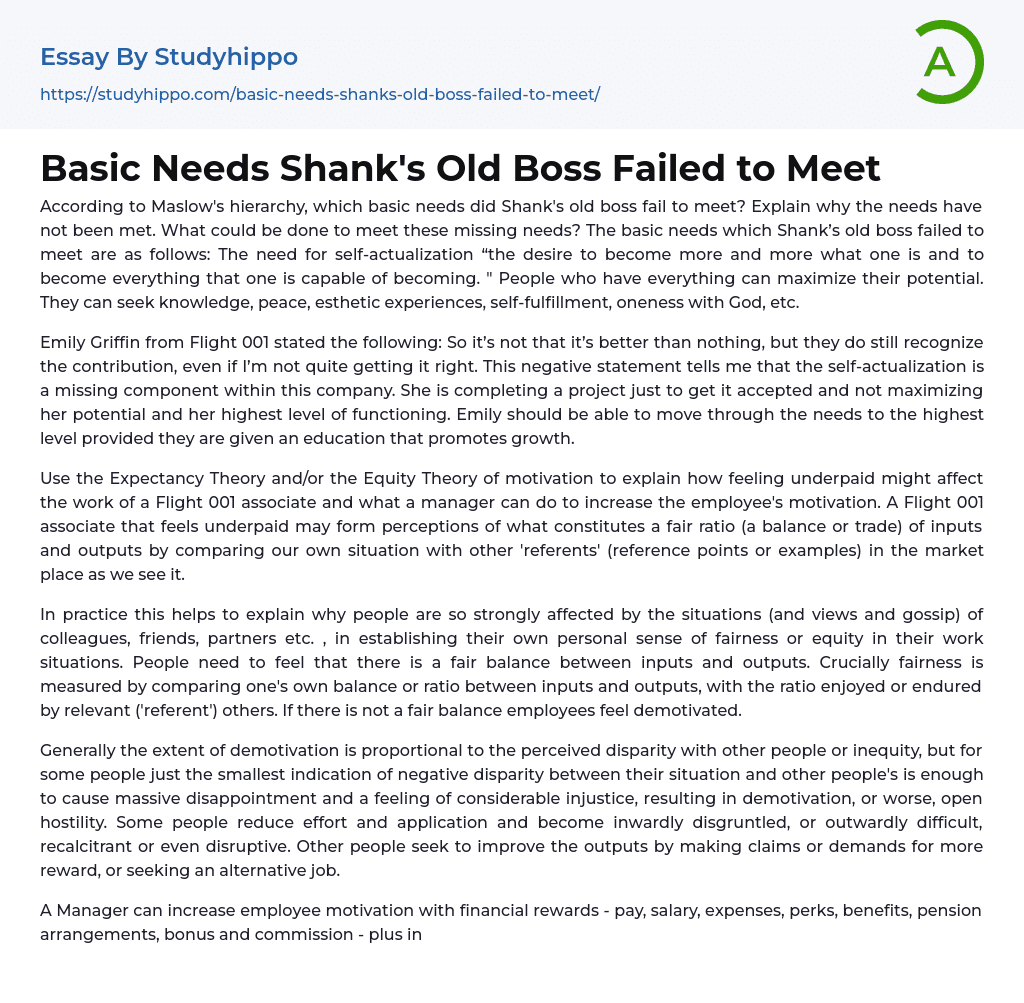In accordance with Maslow's hierarchy, Shank's previous employer did not fulfill certain basic needs. These needs encompass the desire for self-actualization, which involves striving to become one's utmost potential and achieving everything one is capable of. Despite having abundant resources, individuals are able to optimize their capabilities by pursuing knowledge, peace, aesthetic experiences, self-fulfillment, and spiritual harmony, among other aspects. However, Shank's old boss failed to meet these needs. To address these unmet needs, various actions can be taken.
Emily Griffin from Flight 001 expressed that while the contribution is acknowledged, it is not deemed superior and she may not fully comprehend it. This critique implies that the company lacks self-actualization. Instead of achieving her true potential and optimal performance, Emily is merely completing a project for acceptance. Ensuring growth-oriented education is
...essential for Emily to progress towards the highest level of needs.
The Expectancy Theory and Equity Theory of motivation can be used to understand how feeling underpaid can impact the performance of a Flight 001 associate. Comparing their own situation with others in the market, the associate may develop perceptions about what is a fair balance between their efforts and rewards. A manager can take steps to enhance the associate's motivation in response to this issue.
The perception of fairness or equity in one's work is greatly influenced by the situations, views, and gossip of colleagues, friends, partners, etc. It is essential for individuals to believe that there is a fair distribution of effort and rewards. To determine fairness, people frequently compare their own input-output ratio with others ('referent'). When an imbalance exists, employees feel demotivated.
The level of demotivation is typically
related to the perceived difference or inequality in comparison to others. However, even a small indication of negative disparity between one's own situation and that of others can lead to significant disappointment and a feeling of unfairness. This can result in demotivation or, in some cases, even hostility. Some individuals may decrease their efforts and become inwardly discontent or outwardly challenging, resistant, or disruptive. On the other hand, others may try to enhance their outcomes by making requests for additional rewards or seeking a different job.
A Manager has multiple ways to enhance employee motivation. This can be achieved through financial rewards such as pay, salary, expenses, perks, benefits, pension arrangements, bonus, and commission. Additionally, intangible factors like recognition, reputation, praise and thanks, interest, responsibility, stimulus, travel, training, development, sense of achievement, advancement, promotion, etc., also play a significant role in motivating employees.
In order to meet an individual's demands and improve their terms and conditions, managers must comprehend the Equity Theory, particularly its comparative aspect.
Equity Theory highlights the importance of considering individuals and the way they are treated within their environment, such as their team, system, or surrounding. These factors must be managed and addressed accordingly. By referring to Herzberg's Two Factor Theory, we can analyze the hygiene factors that are being fulfilled within Flight 001's work environment as mentioned by employees in the video. It is crucial to identify how these factors are being met. Additionally, we should assess if Flight 001's work environment satisfies any motivation factors and determine which ones they fulfill and how.
The hygiene factors being met within Flight 001’s work environment include working conditions, company policies, and
interpersonal relations. Flight 001 ensures great working conditions for employees and emphasizes their value and importance, regardless of their level of management. This contributes to building positive interpersonal relationships among all employees, making them feel equally valued.
In light of the new baggage policy and charges, customers are inclined to bring additional carry-on luggage on the plane. To ensure customer satisfaction, the employees have been informed and trained on how to respond positively to this revised policy.
- Leadership and Management essays
- Change Management essays
- Project Management essays
- Knowledge Management essays
- Operations Management essays
- Quality Management essays
- Risk Management essays
- Scientific Management essays
- supply chain management essays
- Performance Management essays
- Time Management essays
- Brand Management essays
- Total Quality Management essays
- Risk essays
- Manager essays
- Leadership essays
- Business Ethics essays
- Board Of Directors essays
- Product Management essays
- Comparative Analysis essays
- Decision Making essays
- Dispute Resolution essays
- Stress Management essays
- Business Management essays
- Brand Equity essays
- Branding essays
- Nike, Inc. essays
- Market share essays
- Razor essays
- Being A Leader essays
- Servant Leadership essays
- Leadership Experience essays
- Leadership Qualities essays
- Incentive essays
- Accounting essays
- Andrew Carnegie essays
- Automation essays
- Business Cycle essays
- Business Intelligence essays
- Business Model essays
- Business Operations essays
- Business Software essays
- Cooperation essays
- Cooperative essays
- Corporate Social Responsibility essays
- Corporation essays
- Customer Relationship Management essays
- Family Business essays
- Franchising essays
- Harvard Business School essays




